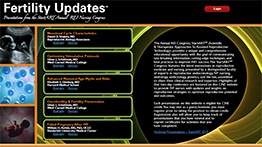FertilityUpdates.com
Curriculum XXIII
Presentations from the StartARTSM REI Nursing Congress
November 1, 2018 - October 31, 2019
Archived, for viewing purposes only.
Purpose
Highlights of the three‐day meeting, StartART
SM Annual REI Nursing Congress, are featured on this CNE website to provide IVF nurses with updates, insights, and strategies to optimize reproductive potential and outcomes. FertilityUpdates.com repurposes important content from StartART
SM Congress to provide a unique and comprehensive educational opportunity with the goal of communicating late‐breaking information, cutting‐edge techniques, and best practices to improve ART success. Like the StartART
SM Congress, FertilityUpdates.com offers presentations that feature the latest innovations in reproductive medicine and nursing presented by a distinguished faculty of experts.
Learning Objectives
After participating in this educational activity, learners should be able to:
- Explain the challenges and management issues associated with advanced parental age;
- Identify women at risk in order to initiate interventions, and potentially improve pregnancy, neonatal and long‐term health;
- Gain knowledge of the physiology of the protein and steroid hormones involved in human reproduction that allows clinicians the ability to manipulate ovarian function in ways that benefit infertile couples
- Review the pharmacological preparations containing either recombinant or urinary FSH used to induce superovulation for IVF or intrauterine insemination
- Recognize the GnRH physiology that has allowed clinicians to control ovarian stimulation better and improve outcomes in IVF-embryo transfer
- Critically evaluate the data comparing different types of endometrial preparation cycles – natural – artificial – letrozole
- Distinguish strategies for selecting stimulation protocols according to responder types to optimize outcomes;
- Assess the data surrounding the different types of estrogen and progesterone used for luteal phase support
- Review progress in male reproductive medicine.
Agenda
Faculty
Previous Activity
Next Activity
